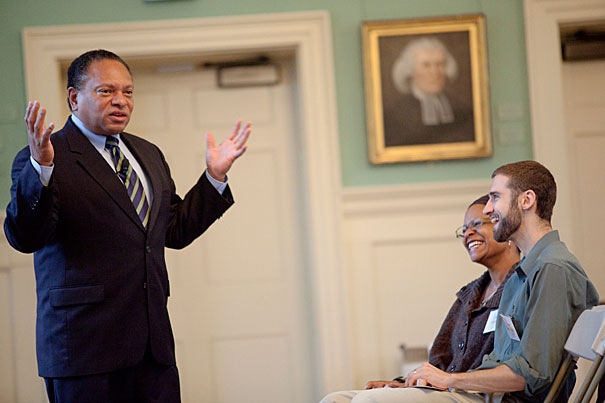
Led by Stephen Young, partner and founder of Insight Education Systems, the seminar, “Microinequities: The Power of Small,” addressed the ways managers send subtle messages, often without being aware of them, that can devalue employees, resulting in impaired performance and productivity.
Photos by Kris Snibbe/Harvard Staff Photographer
Small changes, big effects
Diversity seminar explores “microinequities”
More than 50 administrators and staff gathered in University Hall Thursday for the first of three Diversity Dialogues, a series of seminars focusing on ways to maintain a diverse community throughout the Faculty of Arts and Sciences (FAS).
The seminar included an introduction by FAS Dean Michael D. Smith, who told attendees that the program was just one aspect of a larger effort to support the diverse community throughout FAS.
“Even in this age, where so many of us are tied to computers and iPods and our phones, I truly believe that ideas, especially radical ideas, come from close, unscripted, honest interactions among talented people, and we have a number of talented people in our community,” Smith said. “Bringing together those diverse perspectives is the most effective way for us to continue to cultivate, create, and transmit knowledge in the way we do in this institution.

“I look at diversity as the engine that helps drive this cultivation of new ideas. A commitment to cultivating diversity among our faculty, staff, and students, therefore, is extremely important to us, and is a natural extension of everything else we’re trying to accomplish here in the Faculty of Arts and Sciences.”
Led by Stephen Young, partner and founder of Insight Education Systems, the seminar, “Microinequities: The Power of Small,” addressed the ways managers send subtle messages, often without being aware of them, that can devalue employees, resulting in impaired performance and productivity.
“This program rests on the understanding that when we communicate we use two methods of delivering our messages,” Young said. “We denote and we connote. Denotation has to do with words, their specific definitions and those meanings, while connotation reveals what is really being conveyed. If I could distill this down to its essence, it’s about how the subtle things we do and say are infinitely more revealing and powerful about the nature of a message than any of the words we use on the surface.”
Those connotations, Young said, today most often come in the form of “microinequities” and “microadvantages” — subtle changes in body language, attentiveness, tone of voice, and other traits that offer insight into what someone is actually saying, regardless of the words they use.
In the case of microinequities, Young said, even seemingly simple phrases such as “You’re missing the point” or “Take my word for it” come loaded with connotations that, if they persist over time, can subtly devalue employee contributions, leaving workers feeling marginalized and frustrated. Microadvantages, conversely, can result in employees feeling more engaged and loyal, resulting in a more dynamic, productive workplace.
“The impact that this has on the workplace is, frankly, nothing short of enormous,” Young said. “When this is injected across a platform it changes everything about how people feel about issues of exclusion.
“In your interactions with people, your greeting, your introductions, your responses in meetings, your emails, in everything you do, take into consideration that there are multiple ways to accomplish the objective,” Young added. “One is to do it correctly. The other is to do it with power and effect so you change how people receive it, how they get engaged, and how they become more inclusive.”
Additional Diversity Dialogues are planned for Dec. 15 and April 11. For more information, visit the website.




